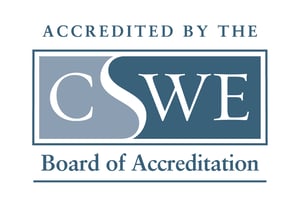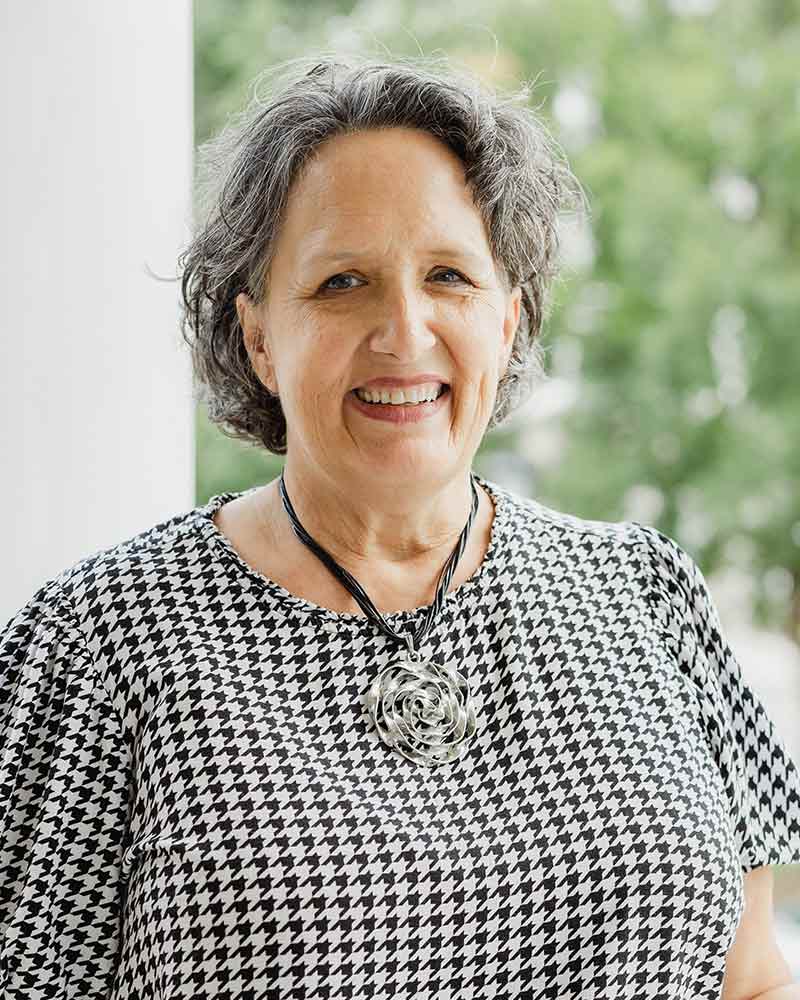Social Work
The Bachelor of Science in social work is a generalist professional degree rooted in the values of service and social justice. With a bachelor’s degree, social workers can practice with individuals, families, groups, and communities. This versatile and practical degree equips students with the theoretical and skills-based education they need to empower those who have been marginalized and oppressed.
According to the National Association of Social Workers (NASW), the primary mission of the social work profession is to enhance human well-being and help meet basic and complex needs of all people, with a particular focus on those who are vulnerable, oppressed and living in poverty. Social workers help relieve and alleviate people's suffering, fight for social justice and improve lives and communities.
Program Benefits
- Graduate with the skills you need to make an impact as a servant leader in one of the fastest-growing professions in the United States.
- Learn from faculty who possess high degrees in the profession, who have relevant and valuable real-world experience, and who make an effort to know you personally.
- Take advantage of Trevecca’s accreditation status with the Council on Social Work Education (CSWE), which also offers an accelerated path for a graduate degree in social work.
What to Expect
Our bachelor of science in social work gives you the foundation to bring empowerment and wholeness to individuals, families, groups, communities, and organizations.
The social work program at Trevecca is accredited by the Council on Social Work Education (CSWE), which is supported by the Council on Accreditation (COA). Students who earn a Bachelor of Science in social work graduate as generalist social work practitioners, meaning that they have completed the course and practicum learning necessary to be able to practice as a professional. Upon graduation, you’ll be able to:
-
Demonstrate competency in the knowledge-base and skills required of beginning social work practice
-
Move into generalist social work practice or specialized graduate studies in social work
-
Exhibit commitment to the basic values and ethics that shape social work practice rooted in a Christian perspective
-
Utilize anti-racist and anti-oppressive social work practices through cultural humility at the individual, family, group, organizational, community, research and policy levels
There are nearly 700,000 professional social workers in the U.S. today with their bachelor's, master’s or doctorate in social work. According to the U.S. Bureau of Labor Statistics, social work is one of the fastest-growing professions in the United States. The NASW projects employment in the field will grow 16 percent by 2026.
Social work students at Trevecca engage in a blend of theory and practice in their coursework, which is designed to provide a broad overview of the profession with theoretical and practical application opportunities. All social work majors at Trevecca select a minor based on their career and personal interests.
Students participate in two internships called practicum. The first, which occurs early in their coursework, involves volunteering at a local nonprofit for 60 semester hours accompanied by a seminar course. During their final semester, students spend 400 semester hours in a social work setting, supervised by a social worker, and this practicum is also accompanied by a seminar course.
Why Choose Trevecca?
Founded in 1901 and a leader in online education for more than two decades, Trevecca helps students discover and pursue an individual calling by providing innovative instruction; cultivating a supportive, Christ-centered community; and establishing relationships that open doors.
Recognized nationally and locally for academic quality, Trevecca has earned a reputation for providing the world with servant leaders, problem solvers and difference makers. Trevecca’s holistic approach to education encompasses intellectual, social, emotional, physical and spiritual growth.
The Trevecca Nazarene University Social Work Program graduates integrated, generalist social workers who are dedicated to service, committed to social justice, and rooted in faith. TNU social work graduates possess the knowledge, awareness, values, and skills to shift conditions of racism and oppression using trauma-informed practices within the ethical guidelines of the profession so that individuals, families, groups, and communities experience equitable, healed, and liberated lives.
 Program Accreditation
Program Accreditation
Trevecca Nazarene University's Bachelor of Science in social work is accredited by the Council on Social Work Education’s Board of Accreditation.
Accreditation of a baccalaureate or master’s social work program by the Council on Social Work Education’s Board of Accreditation indicates that it meets or exceeds criteria for the assessment of program quality evaluated through a peer review process. An accredited program has sufficient resources to meet its mission and goals and the Board of Accreditation has verified that it demonstrates compliance with all sections of the Educational Policy and Accreditation Standards.
Accreditation applies to all program sites and program delivery methods of an accredited program. Accreditation provides reasonable assurance about the quality of the program and the competence of students graduating from the program.
Course Descriptions
Get details on all the courses you’ll complete as you work toward this degree at Trevecca.
Read MoreCareer Opportunities
Trevecca’s Bachelor of Science in social work allows you incredible job variety and mobility, which helps to prevent burnout and increase job satisfaction over the length of your career.
As a social work graduate, you’ll be equipped to offer insight and solutions to every part of your community, from adoption agencies to hospices to other places you may not expect such as government agencies, schools, corporations, hospitals, disaster relief agencies, military centers and prisons. You could choose to provide case management and therapy for individuals; offer counseling and resources to families; listen and amplify community voices; or advocate for legislative policy change at the local, state or national level. Social work also offers opportunities for workers to engage with different populations and age groups, and to practice on the individual, group, community and policy level.
In addition to flexibility, this degree offers above-average earning potential. The U.S. Census Bureau reports the median income for social workers in the U.S. at $47,980 compared to the overall annual personal median income in the U.S. of $31,099. According to a 2019 Trevecca alumni survey, 56 percent of our social work graduates earn more than $36,000 per year, and 23 percent earn more than $50,000 per year.
More than half of Trevecca’s social work undergraduate alumni are working toward or have earned an advanced degree. Many choose to pursue a master’s degree in social work because Trevecca students benefit from the program’s accreditation status with the Council on Social Work Education (CSWE). Students who graduate with a bachelor’s degree from a CSWE-accredited program can apply for advanced standing in an accredited graduate-level social work program because they complete the first-year master’s degree coursework in their undergraduate work. This means they can earn a master’s degree in only 12-14 months, which is a significant cost-reduction benefit for future social workers.
Our Faculty
-

Kathryn Johnson-Warner
Assistant Professor, Program Director for Social Work
-

Lisa Smith
Assistant Professor, Director of Practicum Education for Social Work
Course Descriptions
Get details on all the courses you’ll complete as you work toward this degree at Trevecca.*
General Sociology
SOC 2010
The nature and functions of sociology, the development of social ideas and institutions and the processes of social interactions and social structure. A recommended prerequisite to courses in Sociology numbered above 2000.
Human Diversity
SWK 3350
This course is designed to increase students’ awareness, knowledge, and understanding of diversity, human rights, and social and economic justice through exploring culture, socialization, power, oppression, privilege, and identity. Students will analyze individual and systemic forces that operate in society to oppress, marginalize, and impact the life experience of groups of humans. During this semester, students will engage in a substantial amount of self-reflection about their own identities while having the opportunity to listen and learn from others’ stories.
Human Growth and Development
PSY 2175
A survey of development from conception throughout the life span.
Working with Individuals
SWK 2200
This course is the first in a series of three core practice classes aimed at implementing the theories, models, and interventions of social work in micro (individual), mezzo (group), and macro (community and organization) contexts. This course focuses on best practices for working with individuals. Because this course requires demonstration of skills developed in core social work curriculum, this course is only available to social work majors and minors.
Introduction to Community Practice
SWK 2250
During this first community placement of two in the Social Work curriculum, students participate in at least 60 hours over the course of the semester at a local social welfare agency. Concurrently, students take a one-hour per week seminar that develops students’ professional identities while fusing knowledge and practice in social work. Students will arrange their placement during the semester preceding their placement. This course should not be taken later than the fall of junior year.
Human Behavior and the Social Environment
SWK 2300
This course deeply engages person-in-environment and social systems theories. Through reading, dialogue, lecture, group work, self-reflection, interviews, and case studies, students will study the impact that family, community, group affiliation, and organizational involvement have on a human’s behavior, as well as how a person’s layered identity impacts their own behaviors and society’s behaviors toward them.
Research Methods in Social Work
SWK 3000
This course introduces the practical uses of research in social work practice including skill building, client empowerment, practice evaluation, program evaluation, and needs assessments. Students will identify how to consume and conduct ethical research; mindful of inclusive, client-centered practices. Through reading, dialogue, and practice, students will demonstrate understanding of literature reviews, quantitative and qualitative research design and measurement, data collection, data analyses, and research reporting.
Power to the People: Social Movements and Social Action throughout United States History
SWK 3110/HIS 3110
Working with Groups
SWK 3200
This course is the second in a series of three core practice classes aimed at implementing the theories, models, and interventions of social work in micro (individual), mezzo (group), and macro (community and organization) contexts. This course focuses on best practices for working with groups. Because this course requires demonstration of skills developed in core social work curriculum, this course is only available to social work majors and minors.
Social Welfare Policy
SWK 3500
This course surveys the broad impact of U.S. social welfare policy on a national, state, local, and individual level, deeply considering the intersection of policy and social work practice. Throughout the semester, students will study the history of social welfare policy, apply a problem-focused analysis of current social welfare policies and programs, and formulate their own ideas for future policy changes and improvements.
Working with Communities and Organizations
SWK 4200
This course is the third in a series of three core practice classes aimed at implementing the theories, models, and interventions of social work in micro (individual), mezzo (group), and macro (community and organization) contexts. This course focuses on best practices for working with communities and organizations. Because this course requires demonstration of skills developed in core social work curriculum, this course is only available to social work majors and minors.
Senior Field Practicum
SWK 4400
This 400-hour senior field practicum is supervised by a faculty liaison and an agency-based field instructor with a social work degree. Students arrange their practicum with the agency the April before their practicum begins. This course is for senior social work majors only who have completed all of their required social work courses.
Senior Seminar in Social Work
SWK 4450
This seminar, taken concurrently with SWK 4400 (Senior Field Practicum) enables students to synthesize practice skills acquired in the field with theories, knowledge, and values learned in the classroom. This course is for senior social work majors only who have completed all of their required social work courses.
Working with Family Systems
SWK 4250
This course examines family structure and interaction, emphasizing a family systems theoretical perspective. Through class discussions, readings, case studies, and deep self-exploration, students will investigate traditional and alternative family life cycles, family health, and family disruption.
General Education — 54 hours
General Electives — 0 hours
*For a complete list of courses, tracks and other relevant information, view the program's course catalog.

